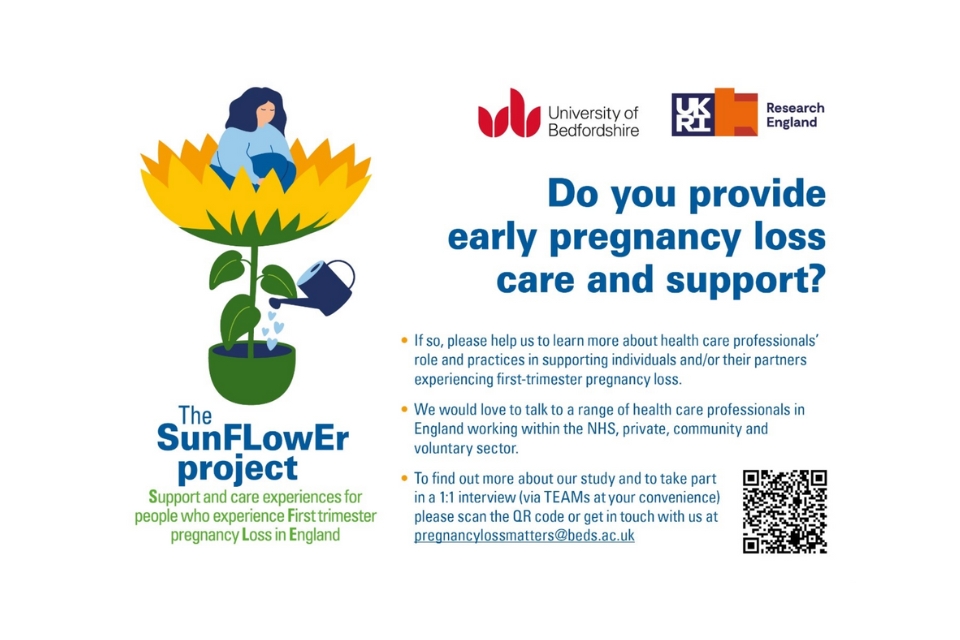Pregnancy loss at any time is traumatic for women and their families. If you are involved in care during early pregnancy. The Pregnancy Loss Research Network at the University of Bedford would like your help as they research support and care experiences.
__________________________________________________________________
Do you provide early pregnancy loss care and support? Take part in an interview to discuss your experiences.
The experience of pregnancy loss can be intensely painful and traumatic, with substantial psychological and social costs to women, their families, and wider society (Farren et al., 2020). Regardless of when the pregnancy loss occurs, the grief experienced by individuals can have significant and long-lasting effects to the well-being of families. Therefore, research to understand optimal care and support for individuals who experience pregnancy loss to improve psychological outcomes is recognised as a national priority (Prior et al., 2017).
Early pregnancy loss can be defined as a miscarriage or ectopic pregnancy that occurs within the first trimester (< 13 weeks gestational age) (NICE Guideline, 2023).
Whilst there is information and clinical guidelines for healthcare professionals on the medical management of early pregnancy loss, psychological morbidity is often overlooked. Despite 2023 updates to the NICE guidelines relating to the care and support of women who experience early pregnancy loss, they focus primarily on the medical management, with less focus on psychological support (NICE, 2023). Women commonly feel dissatisfied with their miscarriage care, often describing inadequate sensitivity, compassion, information, and follow-up care (Geller et al., 2010). Despite evidence that health professionals play an integral role in shaping women’s experiences of miscarriage and the associated psychological impact, there is limited research into the perspectives and practices of health professionals caring for women and their partners experiencing early pregnancy loss. We have therefore created The SunFLowEr Project to conduct research, with the intention of giving a voice to those impacted by early pregnancy loss and those who provide care.
The SunFLowEr Project: Support and care experiences for people who experience First trimester pregnancy Loss in England
The aims of the SunFLowEr project:
The overall aim of this study is to understand the challenges and identify priorities in early pregnancy loss care in England from the perspective of individuals who experience miscarriage, and professionals who provide their care. We aim to collectively identify policy-driven solutions to improve psychological outcomes for individuals who experience trimester one pregnancy loss.
The objectives of this study:
The above aim will be achieved through a mixed methods design of four work packages, with the following objectives:
- To examine how people who experience early pregnancy loss access and experience care and support during and following their miscarriage (WP1).
- To develop an in-depth understanding of care experiences during and following early pregnancy loss for individuals who experience miscarriage and their partners (WP2).
- To explore health care professionals’ role and practices in supporting people who experience early pregnancy loss and the barriers and enablers that impact the quality of care and emotional support provided (WP3).
- Develop a regional pregnancy loss research network situated within England. This will bring together academics, local authorities, NHS partners, commissioners, employers, third-sector organisations, and individuals to facilitate knowledge exchange, evidence-based policy-making and research partnership (WP4).
Who are we currently recruiting?
If you are a midwife and currently provide early pregnancy loss support to women in your care, please consider taking part in an interview and sharing your experiences with us.
To take part, please follow the link below or scan the QR code located in the recruitment advertisement above:
https://bedshealthsciences.eu.qualtrics.com/jfe/form/SV_bxwAn0b9lqWqw2a
If you would like further information on the pregnancy loss research network, please visit our website at: https://www.beds.ac.uk/ihr/the-pregnancy-loss-research-network/.
If you are interested in joining The Pregnancy Loss Research Network please click here.
If you have any questions concerning The SunFLowEr Project, please do not hesitate to email us at: pregnancylossmatters@beds.ac.uk
References
Farren, J., Jalmbrant, M., Falconieri, N., et al (2020). Posttraumatic stress, anxiety and depression following miscarriage and ectopic pregnancy: A multicenter, prospective, cohort study. American Journal of Obstetrics and Gynecology, 222(4), 367.e1-367.e22.
Geller, P. A., Psaros, C., & Kornfield, S. L. (2010). Satisfaction with pregnancy loss aftercare: Are women getting what they want? Archives of Women’s Mental Health, 13, 111–124.
NICE. (2023). Ectopic pregnancy and miscarriage: Diagnosis and initial management. National Institute for Health and Care Excellence; NICE. https://www.nice.org.uk/guidance/ng126/chapter/Recommendations#management-of-miscarriage
Prior, M., Bagness, C., Brewin, J., et al (2017). Priorities for research in miscarriage: A priority setting partnership between people affected by miscarriage and professionals following the James Lind Alliance methodology. BMJ Open, 7(8), e016571.
The Pregnancy Loss Research Network: Dr Faye Powell, Dr Jane Williams, Dr Erica Cook, Amy Ridge.
June 2024


